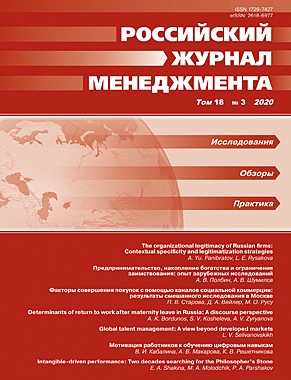The organizational legitimacy of Russian firms: Contextual specificity and legitimization strategies
DOI:
https://doi.org/10.21638/spbu18.2020.301Аннотация
Russian firms suffer from the negative country of origin effect and legitimacy shortage. This paper has the aim to reveal factors for Russian firms to focus on while build legitimacy both at home and abroad. To identify the existing research directions, the 48 articles applying legitimacy and Russian focus from journals in management and business for all years were analyzed, using both the bibliometric analysis and manual in-depth study of papers. Based on the specificity of the Russian context and literature analysis about the factors of the legitimacy concept, we develop a theoretical framework that is supported by a set of propositions about possible legitimization strategies of Russian firms. Three main pillars of the organizational legitimacy construct such as moral, pragmatic and cognitive, which are accepted as the most
influential ones, were introduced and proposed for Russian firms how to gain them at home and abroad. This paper has the value for both theory and practice. It contributes to the legitimacy literature, responding to many calls to study the microfoundations of the organizational legitimacy and developing the holistic theoretical framework within the Russian context. The findings also are of practical importance for managers and entrepreneurs whose attention is paid to the effective strategic management and legitimacy building both at home and abroad.
Ключевые слова:
liability of foreignness, liability of outsidership, organizational legitimacy, moral legitimacy, pragmatic legitimacy, cognitive legitimacy, Russia
Скачивания
Библиографические ссылки
REFERENCES
Загрузки
Опубликован
Как цитировать
Выпуск
Раздел
Лицензия
Статьи журнала «Российский журнал менеджмента» находятся в открытом доступе и распространяются в соответствии с условиями Лицензионного Договора с Санкт-Петербургским государственным университетом, который бесплатно предоставляет авторам неограниченное распространение и самостоятельное архивирование.





